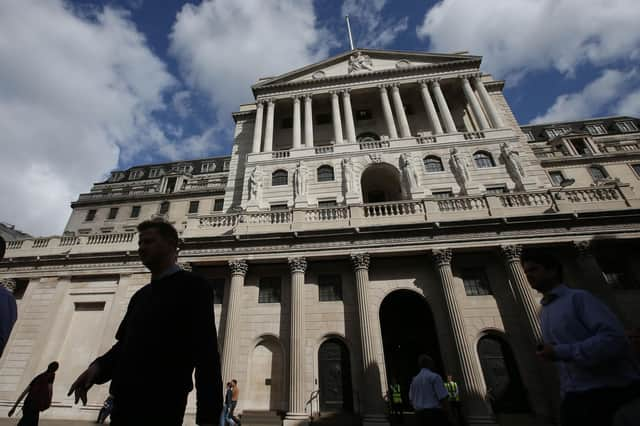Inflation’s role amid a rapidly evolving landscape - Jim Duffy comment


It was a technical term used by central banks and finance ministers that earned them the right to exist. It was a word bandied about at budget time, the monthly meeting at the Bank of England, and in news broadcasts outside Westminster on interest rates.
But only now am I waking up to what inflation really means in a world where the rules of the game have changed. Central banks have existed and flourished in their attempts to regulate inflation.
Advertisement
Hide AdAdvertisement
Hide AdFor decades, interest rates have been used to keep inflation and you and me in check. If inflationary pressure is high, then the good old governor of the Bank of England can raise interest rates to help ease the pressure.
Similarly, if there is not enough inflationary momentum, then rates could be lowered. In essence, for folks like you and me, it meant one of two things. A binary see-saw situation. Raising interest rates meant those of us with mortgages suffered as our monthly payments jumped.
But, if interest rates went up, savers, the retired and those with some cash tucked away won a watch as they made more on the money they had banked. Conversely, when rates dropped, the mortgage payers rejoiced and savers moaned. That was all it was all about for the vast majority of us.
As central banks such as the Fed in the USA, the Old Lady of Threadneedle Street in the UK, and that weird and wonderful creation in Frankfurt called the European Central Bank set rate targets at 2 per cent, we just hoped their “strategies” worked.
But that all changed ten years ago as the interest rate mantra was exhausted by quantitative easing (QE) – printing new money. The latter was supposed to be a short-term fix for the financial crisis. It would thrust lots of cheap capital into the system so the “zombie” economies of the world could continue to flow. Interest rates were set at almost zero.
Savers have suffered as they watched their pots earn dismal rates of interest in banks, building societies, and in savings vehicles like NS&I. At the same time, mortgage lenders did well And that was how it was for the past decade as we waited for “normality” to kick in again so interest rates could head back to 2 per cent. But that has not happened and probably never would have, as we became addicted to stimulus cash and QE.
Roaring
Then came a pandemic. It has been an awful time for many. But not the stock markets in the USA. They are roaring ahead. Zero interest rates means a ton of cheap money sloshing around. Massive stimulus for the Fed has kept Wall Street booming, while small firms close and a harsh winter lies ahead.
But in all of this, inflation never really came into the discussion. Until now and in a big way. Wall Street giant Paul Tudor Jones is using Bitcoin as a hedge against inflation. Warren Buffet, not happy simply buying gold, buys into the biggest gold mine in Canada to stave off inflationary effects on his portfolio.
Advertisement
Hide AdAdvertisement
Hide AdAnd the big one, which means the rule book has been binned and a new one created from thin air – the Fed is now looking for big rises in inflation to drive the economy. In short, everything has failed and it is now time to try something new.
So what does all this mean? Well, 2 per cent inflation is not enough to kick-start the economy of the USA or the UK. It needs to jump to 5 per cent plus so growth can take root. Only then can the central banks justify their existence again by tinkering with rates to lower inflation and slow the hopefully booming economies that have been reborn.
In the meantime, there is a rush to precious metals and Bitcoin, as for big investors what’s the point in making 12 per cent gains if inflation devalues that by 5 per cent? Stock markets will make great gains with stimulus, but with that comes big inflation and a need to hedge as the real value of a dollar or pound actually falls day to day.
I think I get what inflation means now for the likes of me. But I will watch with interest to see if the Fed can pull a rabbit out of the hat and ramp up inflation faster than “normal”.
Jim Duffy MBE, Create Special
A message from the Editor:
Thank you for reading this story on our website. While I have your attention, I also have an important request to make of you.
The dramatic events of 2020 are having a major impact on many of our advertisers - and consequently the revenue we receive. We are now more reliant than ever on you taking out a digital subscription to support our journalism.
Subscribe to scotsman.com and enjoy unlimited access to Scottish news and information online and on our app. Visit https://www.scotsman.com/subscriptions now to sign up. By supporting us, we are able to support you in providing trusted, fact-checked content for this website.
Joy Yates
Editorial Director
Comments
Want to join the conversation? Please or to comment on this article.